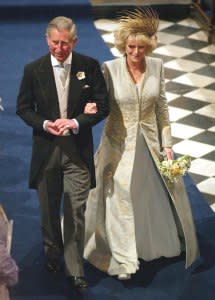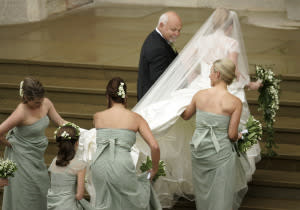Can Meghan Markle get married in the Church of England? and other questions, answered
Meghan Markle and Prince Harry are engaged! While Kensington Palace confirmed that the pair are set to wed in Spring 2018, there are a few complexities when it comes to the big day.
Not since Edward VIII famously abdicated the throne to marry twice-divorced American Wallis Simpson in 1936 has an heir to the throne wed an American — and like Simpson, Markle is divorced. But a lot has changed in the decades since then, and Harry and Meghan are facing a far more relaxed monarchy. What’s more, their wedding won’t be a carbon copy of Prince William and Kate Middleton‘s elaborate 2011 nuptials. Here’s what to expect — and answers to your burning questions.
Will Markle’s divorce pose any problems?
Markle, 36, married director Trevor Engelson in 2011, and they split less than two years later, in 2013. For centuries, divorce was frowned upon by the Church of England and members of the British royal family were forbidden — or at the very least, strongly discouraged — from marrying someone who was divorced.
The history-shaking controversy surrounding Edward’s abdication, as fans of The Crown will attest, has never been forgotten by Queen Elizabeth, who was just 10 when her uncle stepped aside — paving the way for her own ascension to the throne. Edward married Simpson in 1937 in exile in France.

Meanwhile, the Queen’s younger sister, Princess Margaret, faced her own difficulties: She was strongly discouraged from marrying the divorced Peter Townsend, which eventually helped end their relationship in the early 1950s.

But times have changed.
In 2002, the General Synod – the governing body of the Church of England – voted to recognize “that some marriages regrettably do fail.” They added, “there are exceptional circumstances in which a divorced person may be married in church during the lifetime of a former spouse.” Any decision “as to whether or not to solemnize such a marriage in church after divorce rests with the minister.”
Although the Queen and Prince Philip will celebrate their 70th wedding anniversary on November 20, three of their four children have been divorced. (All but Prince Edward.) In 2005 when Prince Charleswed his now-wife, Camilla, Duchess of Cornwall — who has also been divorced — they married in a civil ceremony, because having a religious ceremony was “too controversial at the time,” says Scot Peterson, a research fellow in Constitutional Studies at the University of Oxford. After the first ceremony, they had a service of blessing at nearby St. George’s Chapel in Windsor in April 2005.

“We don’t know what the legal advice was when Charles and Camilla were married – the file has never been released,” Peterson tells PEOPLE. “The government has generally objected in the past to marriages between royals and divorcés. But at some point in the last 10 years, there was legal advice and people have asked for that file and it has not been released.”
What about religion?
In order to remain in the line of succession, members of the royal family cannot be Catholic. The vast majority are members of the Church of England, with the Queen serving as the head of the church. And until 2013, laws forbade members of the family from marrying someone who is Catholic. It was a restriction couples could work around: Peter Phillips’s wife, Autumn, converted from Catholicism before their May 2008 wedding. If she hadn’t, Phillips — the Queen’s eldest grandchild, who is 13th in line to the throne — would have lost his place in the line of succession.

However, in 2013, Britain modernized their laws. Now, those in the immediate line of succession can marry anyone they like, regardless of religion (provided they have permission from the monarch if they’re one of the first six in line to the throne). The rules regarding gender were also changed, so that a first-born daughter would inherit the throne, irrespective of whether a boy followed. Under the previous primogeniture rule, any boy would take priority over an older sister.
Markle’s religious affiliation is not known, though she did attend a private Catholic school growing up. (Markle’s first wedding was reportedly a Jewish ceremony due to Engelson’s faith.) But regardless of what she practices, it won’t affect her ability to marry Harry or threaten his place in the line of succession.
Who could conduct the ceremony?
Unlike with Charles and Camilla, PEOPLE understands that the Archbishop of Canterbury Justin Welby has no issue with conducting the ceremony for Harry and Markle – if he’s asked.
“Following the guidelines of the Church of England, the Archbishop wouldn’t have any problem with officiating with their wedding if it got to that point,” says a source close to the Archbishop.

Insiders tell PEOPLE that it was felt that the previous Archbishop, Dr. Rowan Williams, was not able to marry Charles and Camilla because their relationship was a factor in the end of both of their first marriages.
Where could they get married?
Experts tell PEOPLE it’s likely Meghan and Harry could decide to mirror Prince Charles’s understated second wedding, rather than William’s lavish affair, by going for a more low-key ceremony outside of London.
Historian Hugo Vickers, who is close to senior members of the royal family, says, “Meghan Markle has already been married, so I believe they would have a service of blessing.”
“You wouldn’t necessarily have a big grand ceremony, and it would be more like Charles and Camilla,” says Peterson, who is the author of Legally Married: Love and Law in the UK and the US.
If Harry and Markle choose this more relaxed option, then they are likely to opt for somewhere like St. George’s Chapel at Windsor Castle. The royal family certainly likes the setting: Besides Charles and Camilla, it’s where Charles’s brother Prince Edward married Sophie, Countess of Wessex, and Peter Phillips wed wife Autumn. William is a fan of the spot, too.

Although William and Kate married in the grandeur of Westminster Abbey, “he would have liked to have married at St. George’s Chapel,” Vickers says. “The only reason was that it didn’t have a balcony [for the newlyweds’ big kiss]. He would have liked to have done it at Windsor too.”
No matter what, though, Harry and Markle will blaze their own path — as they have already done.
“I don’t imagine that Prince Harry will go for a big grand wedding,” Vickers says. “He would want to do it his own way.”